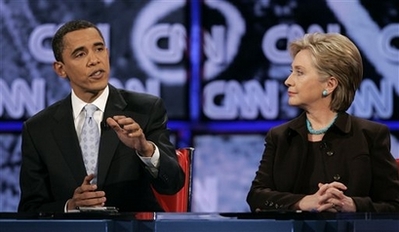
Heya. Sorry this is going up so late…I spent the evening at the Generation Obama event in Midtown, so my usual prObama take on the debates got even more reinforcement than usual…
First off, it was heartening to watch a surprisingly substantive debate. The Nevada roundtable was too sweet, and the Myrtle Beach slugfest was too sour, but tonight’s much-heralded showdown in Los Angeles actually seemed just right. [Transcript.] Both candidates were able to tease out and discuss notable differences in their policies, particularly on health care, immigration reform, and Iraq, while keeping a civil, friendly tone that didn’t seem as unnaturally forced as back in Vegas.
With all that being said, and to no one’s surprise, I thought Barack Obama came out ahead this evening. (In fact, I agree with Andrew Sullivan — this might’ve been his best debate thus far.) He showed a clear and nuanced command of policy. He made a solid case for his strengths, most notably on the question of judgment (“Right on Day 1.”) He explained well how he’s more electable, particularly against John McCain. He was wry and personable. And — when it came to the Republicans — he was often devastating. (That Romney takedown was too rich.)
Hillary Clinton was also good tonight, but she gave more than a few answers that were real groaners. On immigration reform, her attempt to be Obamaesque by invoking the Statue of Liberty was strange and flat. More problematically, her answer on drivers’ licenses for illegal immigrants made no sense (She’s against licenses for illegals, to protect illegals?) And, worst of all, when given the chance to defuse a zero-sum understanding of the immigrant issue, she instead told a story about an African-American man who blamed Latinos for his job loss, and it was hard not to read an off-putting Bendixen subtext into it.
Most notably, when it came to Iraq in the final third, Clinton was terrible. Rather than just admit she made a mistake in either [a] supporting the war or [b] believing Dubya, she seemed unwilling to concede any possibility of error, and got stuck in an increasingly tortured answer about her position on the AUMF vote. It was unseemly, to say the least, even Dubyaesque. And the more she spun her wheels, the better Obama looked. Update: Apparently, she also butchered the truth about the Levin Amendment.
Still, my general impression is that CNN’s Jeff Toobin basically got the larger chess game right: As a TPM commenter well put it: Hillary Clinton is currently in the lead and is trying to run the four corners until the clock runs out. Barack Obama is surging massively right now and didn’t want to upset that o-mentum unduly. So neither candidate felt they needed to shake up the current paradigm all that much, which helped keep everything friendly.
Instead, Obama wanted to show undecideds that he has presidential gravitas and can policy-wonk as needed. Clinton wanted to staunch her negatives and get the focus back on her rather than Wild Bill. (Which reminds me, no question about Kazakhstan?) In that sense, both candidates accomplished what they came to do.
Now, it’s up to us.

